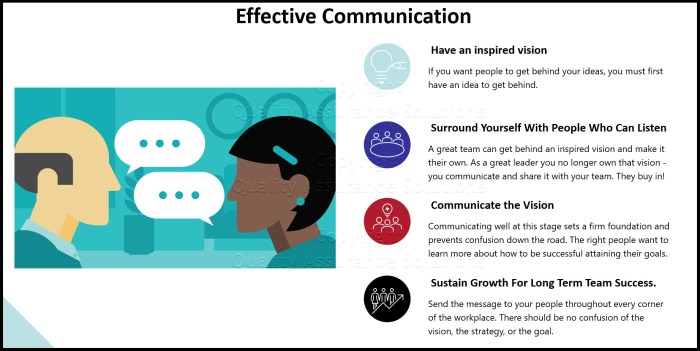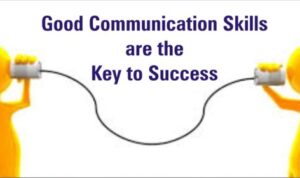Kicking off with Effective Communication Skills, this opening paragraph is designed to captivate and engage the readers, setting the tone american high school hip style that unfolds with each word.
Effective communication skills are the key to success in both personal and professional settings. From active listening to adapting communication styles, these skills play a crucial role in how we connect with others and achieve our goals. Let’s dive into the elements and strategies that can help you master the art of effective communication.
Importance of Effective Communication Skills
Effective communication skills are essential in both personal and professional settings. They play a crucial role in building strong relationships, fostering teamwork, and increasing productivity. Without effective communication, misunderstandings can arise, leading to conflicts and hindered progress.
Enhancing Relationships
Effective communication skills can enhance relationships by promoting understanding, trust, and respect. When individuals are able to express their thoughts and feelings clearly, it helps to build connections and strengthen bonds. By actively listening and responding appropriately, people can avoid misinterpretations and conflicts, leading to healthier and more fulfilling relationships.
Boosting Productivity
In a professional setting, effective communication skills are key to improving productivity. Clear communication ensures that tasks are understood correctly, deadlines are met, and goals are achieved efficiently. By communicating effectively with colleagues, managers, and clients, individuals can work together seamlessly towards common objectives, ultimately driving success and growth for the organization.
Impact of Poor Communication
On the flip side, poor communication skills can have detrimental effects on relationships and productivity. Misunderstandings, lack of clarity, and misinterpretations can lead to conflicts, delays, and mistakes. When communication breakdowns occur, trust is eroded, morale decreases, and work suffers. It is crucial for individuals to continuously work on improving their communication skills to avoid these negative consequences.
Elements of Effective Communication Skills

Effective communication involves several key elements that contribute to successful interactions and relationships. These elements include active listening, clarity, empathy, and non-verbal cues. Let’s delve into each of these elements and understand how they enhance communication effectiveness.
Active Listening, Effective Communication Skills
Active listening is a crucial element of effective communication that involves fully concentrating, understanding, responding, and remembering what is being said. It shows the speaker that you are engaged and interested in what they have to say. For example, nodding your head, maintaining eye contact, and paraphrasing what the speaker has said are all active listening techniques that demonstrate attentiveness and understanding.
Clarity
Clarity in communication ensures that your message is easily understood by the recipient. Using simple and concise language, avoiding jargon, and structuring your message logically are all ways to achieve clarity. For instance, providing clear instructions, avoiding ambiguity, and confirming understanding through feedback can enhance clarity in communication.
Empathy
Empathy involves understanding and sharing the feelings of another person. By empathizing with others, you can establish a deeper connection and build trust in your communication. For example, acknowledging someone’s emotions, showing compassion, and expressing understanding can create a supportive and empathetic communication environment.
Non-Verbal Cues
Non-verbal cues, such as body language, facial expressions, and tone of voice, play a significant role in communication. They can convey emotions, attitudes, and intentions that complement or contradict verbal messages. For instance, maintaining good posture, smiling, and using appropriate gestures can reinforce your verbal communication and enhance the overall message.
Adapting Communication Style
Adapting your communication style based on the audience is essential for effective communication. Understanding the preferences, cultural background, and communication needs of your audience can help tailor your message for better reception. For example, adjusting your tone, vocabulary, and communication approach when speaking to different groups or individuals can improve understanding and engagement.
Strategies to Improve Communication Skills
Effective communication is essential in all aspects of life, whether it be in personal relationships, professional settings, or even casual conversations. Here are some practical strategies to enhance your communication skills:
Practicing Active Listening
Active listening involves fully concentrating, understanding, responding, and remembering what is being said. It shows the speaker that you are genuinely interested in what they have to say, fostering a stronger connection and improving overall communication.
Asking Clarifying Questions
Asking clarifying questions helps ensure that you have a clear understanding of the message being conveyed. It also demonstrates to the speaker that you are actively engaged in the conversation and interested in learning more.
Giving Constructive Feedback
Constructive feedback is crucial in improving communication skills. By providing feedback in a positive and constructive manner, you can help others understand how their message is being received and make adjustments as needed.
Overcoming Communication Barriers
Communication barriers such as language differences or cultural nuances can hinder effective communication. To overcome these barriers, it is important to be patient, open-minded, and willing to learn about different communication styles and practices.
Importance of Self-awareness and Emotional Intelligence
Self-awareness and emotional intelligence play a significant role in improving communication skills. By understanding your own emotions, thoughts, and behaviors, you can better navigate conversations, manage conflicts, and build stronger relationships with others.
Developing Effective Written Communication Skills: Effective Communication Skills

Effective written communication skills are essential in various contexts such as emails, reports, and presentations. Clear and professional written messages can convey information accurately, build credibility, and ensure that the intended message is understood by the recipient.
Crafting Clear, Concise, and Professional Written Messages
- Start with a clear purpose: Before writing, determine the main objective of your message to ensure clarity and focus.
- Use simple language: Avoid jargon or complex terminology that may confuse the reader. Keep sentences short and to the point.
- Organize your content: Structure your message with a logical flow, using paragraphs and bullet points to break up information.
- Be concise: Get straight to the point and avoid unnecessary details that may distract from the main message.
Proofreading, Formatting, and Language Tips
- Proofread your message: Always review your written communication for errors in grammar, spelling, and punctuation before sending.
- Format for readability: Use headings, bullet points, and subheadings to make your message easy to scan and understand.
- Use appropriate language: Tailor your tone and style to match the audience and purpose of your communication. Avoid slang or informal language in professional settings.
- Consider the medium: Adjust your writing style based on whether you are writing an email, report, or presentation to ensure the message is appropriate for the context.
